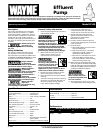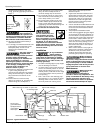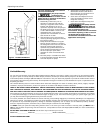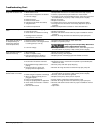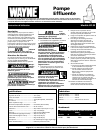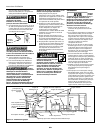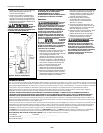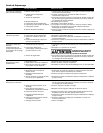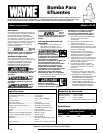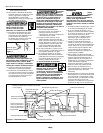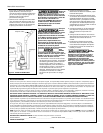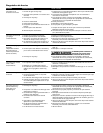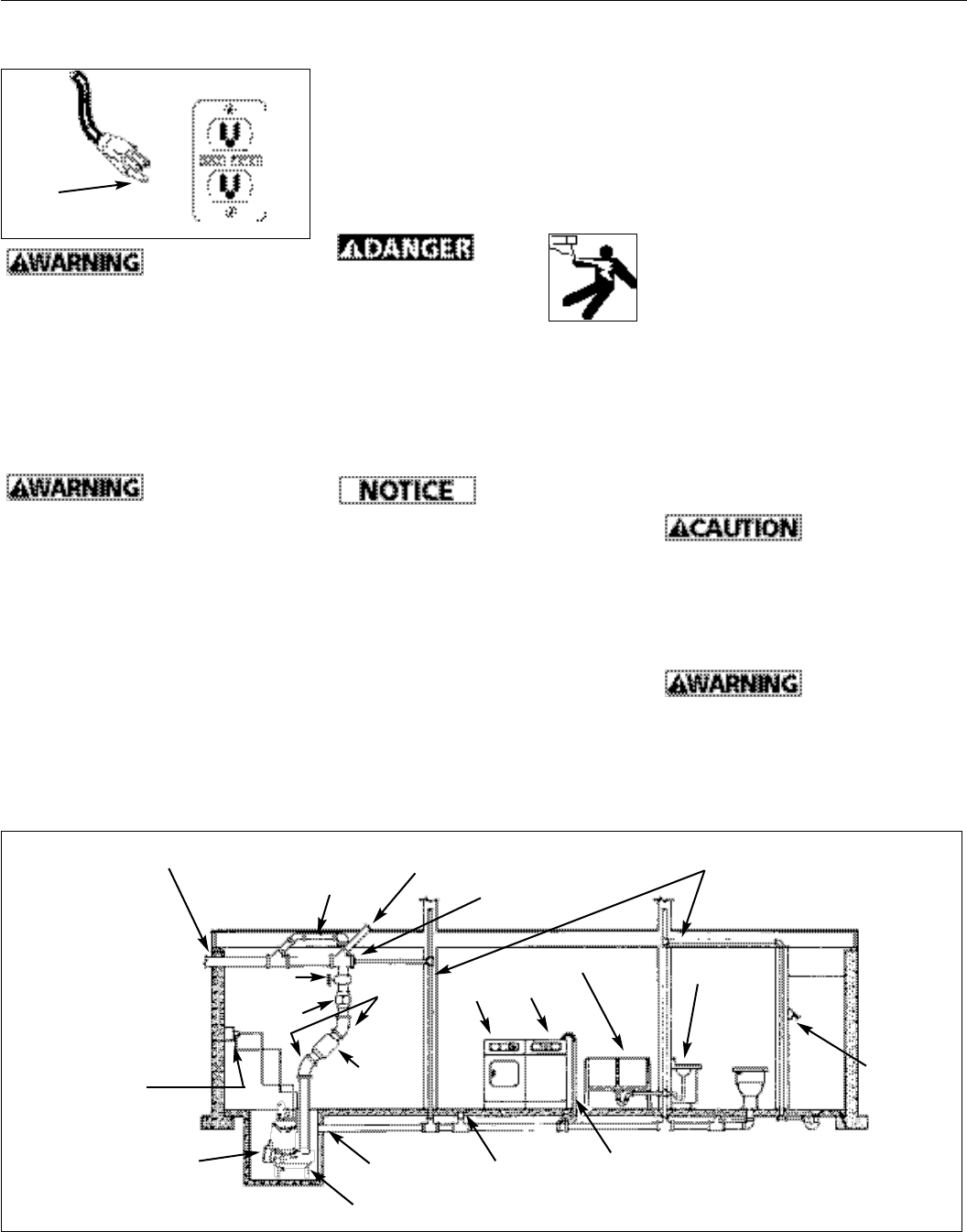
repair damaged or worn cords im me di -
ate ly. Use wire of adequate size to
minimize voltage drop at the motor.
16. Do not handle a pump or pump motor
with wet hands or when standing on a
wet or damp surface, or in water.
17. Do not hang this product by the carry
handle. Effluent pumps should be set
firmly on their legs and supported by
rigid piping. This eliminates twisting and
damage during pump operation.
18. Do not use an extension cord.
Do not walk on wet area
until all power has been
turned off. If the shut-off
box is in basement, call the
electric company to shut-off service to
the house, or call the local fire
department for instructions. Remove
pump and repair or replace. Failure to
follow this warning can result in fatal
electrical shock.
Installation
In any installation
where property
damage and/or personal injury might
result from an inoperative or leaking
pump due to power outages, discharge
line blockage or any other reason, use
a backup system(s).
1. Thread the discharge pipe or pipe nipple
into the dis charge connection.
2. If a check valve is used, mount the check
valve in a horizontal position or at a 45°
angle with the valve pivot on top. In a
vertical position, solids will tend to lodge
on the valve flapper and can prevent it
from opening.
3. Drill a 1/16" hole in the discharge pipe
ap prox i mate ly 1" to 2” above the pump
discharge when a check valve is used.
The hole prevents air locking of the
an ap proved 3-con duc tor cord and 3-
prong, grounding-type plug as shown in
Fig ure 1.
Where a 2-prong
wall receptacle is
encountered, it must be replaced with
a properly grounded 3-prong re cep ta -
cle installed in accordance with the
NEC and local codes and ordinances.
12. All wiring should be performed by a
qualified elec tri cian.
13. It is strongly recommended that this unit
is plugged into a Ground Fault Circuit
Interrupter (GFCI). Con sult a local
electrician for installation and
availability.
The pump motor is
equipped with
automatic resetting thermal protector
and may restart unexpectedly.
Protector tripping is an indication of
motor overloading as a result of
operating the pump at low heads (low
discharge restriction), excessively high
or low voltage, inadequate wiring,
incorrect motor conditions, or a
defective motor or pump.
14. This pump is designed to transfer water
in cycles. Using this pump in a
continuous duty application by ma nip u -
lat ing the switch to stay on, will effect
the per for mance and the life of the
product.
15. Protect electrical cord from sharp
objects, hot sur fac es, oil, and chemicals.
Avoid kinking the cord. Re place or
2
Operating Instructions
pump at the initial start-up and if it
should lose prime.
4. A gate valve should be installed in the
system after the check valve. This gate
valve should be a full port valve which
will pass 3/4” solids or as required by
state and local codes. This gate valve
permits removal of the pump and/or
check valve for servicing.
5. A union should be installed between the
check valve and the pump so the pump
can be removed with least disturbance
of the piping.
6. The pump has a detachable tether
switch with a piggyback plug (see Figure
3). The length of the tether (distance of
cord from float to clamp) should not be
set shorter than 3-1/4 inches and should
not be used in a basin smaller than 14
inches in diameter. If using a differential
other than the factory setting, be sure
when the pump shuts off at least 4” of
fluid is left in the basin so the impeller
remains submerged.
7. When a tether switch is used, rigid dis -
charge pipe is required. If the pump is
allowed to move, the tether switch
could be re strict ed by the basin wall,
pre vent ing the pump from operating.
Before removing
pump from basin
for service, always disconnect electrical
power to pump and control switch. For
any work on pump or switch, ALWAYS
unplug the power cord. Do not just turn
off circuit break er or unscrew fuse.
Maintenance
Make certain that
the pump is
unplugged before attempting to
service or remove any component. This
pump is assembled in the factory using
special equipment; therefore only
authorized service dealers or qualified
electricians should attempt to repair
Grounding
Blade
Figure 1
Main waste line to sewer or septic tank
Upper level drainage
Three prong
grounded outlet
equipped with a
ground fault
interruptor
2” Discharge pipe
Float switch
Effluent pump
Cleanout
Vent pipe
2” Gate
Valve
Union
2” Check
Valve
45
o
Elbow
Laundry tubs
Washer
Dryer
Floor drain
Washer drain
Lavatory
Shower
Flange
Figure 2 - Typical Installation
www.waynepumps.com



